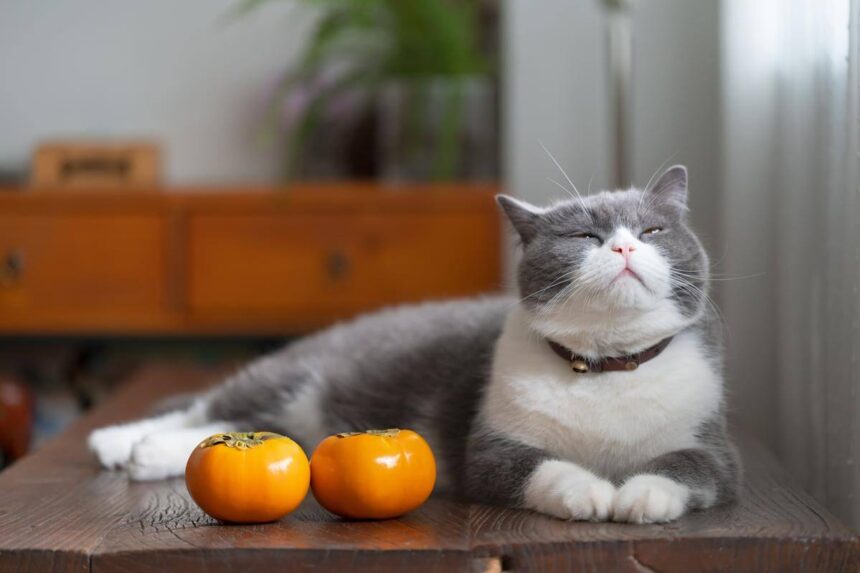Persimmons are delicious fruits known for their vibrant color, sweet taste, and various health benefits. As a cat owner, you may be curious about whether persimmons can be included in your feline friend’s diet. While cats have different dietary needs compared to humans, it’s essential to understand the potential risks and benefits before introducing any new food into their diet. In this article, we will explore the safety of persimmons for cats and provide recommendations on incorporating this fruit into their meals.
Can Cats Safely Eat Persimmons?
Persimmons, in moderate amounts, are generally considered safe for cats to consume. However, it’s important to take certain precautions and understand potential risks before offering persimmons to your feline companion.
Choking Hazard
Persimmons contain seeds and a fibrous core that can pose a choking hazard to cats. Before offering persimmons, ensure they are properly peeled, deseeded, and cut into small, manageable pieces. This reduces the risk of choking and makes it easier for your cat to consume.
Allergic Reactions
Some cats may have allergies or sensitivities to certain fruits, including persimmons. If your cat has never consumed persimmons before, it’s advisable to introduce a small amount and monitor for any adverse reactions. Signs of an allergic reaction may include vomiting, diarrhea, excessive itching, or difficulty breathing. If you notice any of these symptoms, discontinue feeding persimmons and consult your veterinarian.
Digestive Upset
Cats have sensitive digestive systems, and introducing new foods can potentially lead to gastrointestinal issues. Persimmons contain a significant amount of dietary fiber, which, in excess, can cause digestive upset, including diarrhea or constipation. Start by offering a small amount of persimmon to gauge your cat’s tolerance. If they tolerate it well, you can gradually increase the portion size over time.
Benefits of Persimmons for Cats
While persimmons should not be a staple in a cat’s diet, they do offer some potential health benefits when fed in moderation.
Nutritional Content
Persimmons are rich in vitamins A and C, which play vital roles in maintaining a healthy immune system, promoting healthy skin, and supporting vision. They also contain dietary fiber, which can aid in digestion and prevent constipation.
Antioxidant Properties
Persimmons are known for their high antioxidant content, including compounds like beta-carotene and lycopene. These antioxidants help combat free radicals in the body, reducing the risk of oxidative stress and inflammation.
Hydration
Persimmons have a high water content, which can contribute to your cat’s overall hydration. Adequate hydration is crucial for maintaining healthy organ function and preventing urinary tract issues in cats.
Feeding Persimmons to Your Cat
If you decide to offer persimmons to your cat, it’s important to do so in a controlled manner.
Moderation is Key
Persimmons should only be offered as an occasional treat and should not exceed 10% of your cat’s daily caloric intake. Remember, a balanced and nutritionally complete cat food is the foundation of your cat’s diet.
Preparation
Ensure that the persimmons are ripe, peeled, deseeded, and cut into small, cat-friendly portions. Remove any leaves or stems before serving.
Introduce Gradually
Start by offering a small piece of persimmon to assess your cat’s reaction. Monitor for any digestive issues or allergic reactions. If your cat shows any negative response, discontinue feeding persimmons.
Consult Your Veterinarian
If you have any concerns or questions about including persimmons in your cat’s diet, it’s always best to consult with your veterinarian. They can provide personalized advice based on your cat’s specific health needs.
How should persimmons be prepared for cats?
When preparing persimmons for cats, it’s important to follow these steps:
Choose ripe persimmons: Opt for fully ripe persimmons that are soft and have a sweet aroma. Unripe persimmons can be astringent and may cause digestive issues in cats.
Peel the persimmons: Remove the skin of the persimmons before offering them to your cat. The skin can be tough and difficult to digest for cats.
Remove the seeds: Take out the seeds from the persimmon flesh. The seeds can pose a choking hazard and should not be consumed by your cat.
Cut into small, bite-sized pieces: Slice the persimmon into small, cat-friendly pieces. This makes it easier for your cat to eat and reduces the risk of choking.
Introduce gradually: Start by offering a small piece of persimmon to your cat and observe their reaction. If they tolerate it well, you can gradually increase the portion size over time.
FAQ’s
Can cats eat the skin of a persimmon?
It is generally recommended to remove the skin of the persimmon before feeding it to your cat. The skin can be tough and difficult for cats to digest, and it may also contain pesticides or other chemicals that could be harmful to your pet. Peeling the persimmon ensures that your cat is consuming only the flesh, reducing the risk of digestive issues or adverse reactions.
Are all types of persimmons safe for cats?
The most common types of persimmons found in grocery stores are Fuyu and Hachiya persimmons. Both varieties can be offered to cats, but it’s important to note that the Hachiya variety needs to be fully ripe and soft before feeding it to your cat. Unripe Hachiya persimmons contain high levels of tannins, which can cause digestive upset. Always ensure that the persimmons you offer to your cat are ripe, regardless of the variety.
Are there any other fruits that are safe for cats to eat?
Yes, there are several fruits that cats can safely consume in moderation. Some examples include small pieces of watermelon, cantaloupe, blueberries, and bananas. However, always remember to remove any seeds, pits, or inedible parts before offering them to your cat. Additionally, it’s important to introduce new fruits gradually and observe your cat for any adverse reactions.
Can persimmons be toxic to cats?
Persimmons themselves are not considered toxic to cats. However, as mentioned earlier, it’s crucial to remove the seeds, which can pose a choking hazard. Additionally, feeding persimmons in excessive amounts or if your cat has an underlying sensitivity or allergy to the fruit may lead to digestive upset. If you suspect your cat has ingested a large amount of persimmon seeds or is showing signs of distress after consuming persimmons, contact your veterinarian immediately.
Can cats eat persimmon leaves?
No, it is not recommended to feed persimmon leaves to cats. The leaves can contain compounds that may be toxic to cats when ingested in large amounts. It’s best to stick to feeding only the ripe flesh of the persimmon to your cat and avoid offering any other parts of the plant.
Can kittens eat persimmons?
It is generally advised to wait until kittens are older before introducing any new foods, including persimmons, into their diet. Young kittens have delicate digestive systems that are still developing, and sudden dietary changes can cause gastrointestinal upset. It’s best to consult with your veterinarian for guidance on when and how to introduce new foods to kittens.
Can persimmons cause urinary tract problems in cats?
There is no direct link between persimmons and urinary tract problems in cats. However, it’s essential to consider the overall balance of your cat’s diet, including their water intake and the presence of any underlying urinary tract issues. Adequate hydration is crucial for maintaining a healthy urinary tract, so it’s always recommended to provide fresh water and a nutritionally balanced diet that meets your cat’s specific needs. If your cat has a history of urinary tract problems, consult your veterinarian before introducing any new foods, including persimmons.
Can persimmons be used as a remedy for hairballs in cats?
While persimmons contain dietary fiber that can aid in digestion, they should not be relied upon as a remedy for hairballs in cats. Hairballs are a common occurrence in cats due to their grooming habits, and the best way to manage them is through regular brushing to remove loose hair and promote healthy digestion. If your cat is prone to hairballs, consult your veterinarian for appropriate hairball remedies and dietary recommendations.
Can persimmons be used as a remedy for hairballs in cats?
While persimmons contain dietary fiber that can aid in digestion, they should not be relied upon as a remedy for hairballs in cats. Hairballs are a common occurrence in cats due to their grooming habits, and the best way to manage them is through regular brushing to remove loose hair and promote healthy digestion. If your cat is prone to hairballs, consult your veterinarian for appropriate hairball remedies and dietary recommendations.
What are some alternative fruits that are safe for cats to eat?
If you’re looking to offer some variety in your cat’s diet, there are a few other fruits that can be safely fed to cats in moderation. These include small pieces of ripe, seedless watermelon, cantaloupe, blueberries, and bananas. Remember to always remove any seeds, pits, or inedible parts before offering these fruits to your cat. Introduce new fruits gradually and monitor your cat for any adverse reactions.
Conclusion
In conclusion, persimmons can be safely fed to cats in moderation, but precautions should be taken. Ensure persimmons are ripe, peeled, deseeded, and cut into small pieces to reduce the risk of choking. Watch for any signs of allergies or digestive upset when introducing persimmons to your cat. Remember that persimmons should only be an occasional treat and not a significant part of your cat’s diet. Always prioritize a nutritionally balanced cat food that meets your cat’s dietary requirements. When in doubt, consult your veterinarian for guidance on providing the best nutrition for your feline friend.



